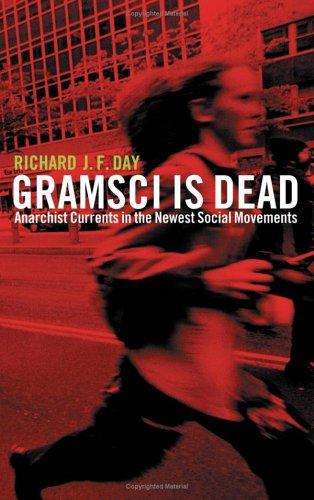Gramsci is Dead - Info and Reading Options
Anarchist Currents in the Newest Social Movements
By Richard J. F. Day

"Gramsci is Dead" is published by Pluto Press in 2005-09-28 - London, England, it has 262 pages and the language of the book is English.
“Gramsci is Dead” Metadata:
- Title: Gramsci is Dead
- Author: Richard J. F. Day
- Language: English
- Number of Pages: 262
- Publisher: Pluto Press
- Publish Date: 2005-09-28
- Publish Location: London, England
“Gramsci is Dead” Subjects and Themes:
- Subjects: ➤ Radicalism - Socialism - Communism - Poststructuralism - Anarchism - Post-Anarchism
- People: Antonio Gramsci (1891-1937)
Edition Specifications:
- Format: Paperback
- Weight: 9.6 ounces
- Dimensions: 8.2 x 5 x 0.7 inches
- Pagination: vii, 262p.
Edition Identifiers:
- Google Books ID: 9tBpQgAACAAJ
- The Open Library ID: OL7955571M - OL7833756W
- Online Computer Library Center (OCLC) ID: 750633281
- Library of Congress Control Number (LCCN): 2005001486
- ISBN-13: 9780745321127
- ISBN-10: 0745321127
- All ISBNs: 0745321127 - 9780745321127
AI-generated Review of “Gramsci is Dead”:
"Gramsci is Dead" Table Of Contents:
- 1- Acknowledgements
- 2- Introduction
- 3- Seattle, anarchism and the corporate mass media
- 4- Naming ‘the movement’ … and other key terms
- 5- Who is speaking?
- 6- The argument
- 7- Doing it Yourself: Direct-action Currents in Contemporary Radical Activism
- 8- Zero-participation: crusty punks and lifestyle anarchists
- 9- The incredible lightness of cultural subversion
- 10- Getting heavy: impeding the flows of state and corporate power
- 11- Direct-action casework: a hybrid form
- 12- Prefiguring/creating alternatives
- 13- Beyond reform, this side of Revolution
- 14- Tracking the Hegemony of Hegemony: Classical Marxism and Liberalism
- 15- We can’t hear you! Liberals and Marxists on the newest social movements
- 16- Classical liberalism and the bourgeois revolutionaries
- 17- Hegemony = dictatorship + democracy
- 18- Gramsci, Lenin and the hegemony of hegemony
- 19- Tracking the Hegemony of Hegemony: Postmarxism and the New Social Movements
- 20- The long middle of the twentieth century
- 21- What was new about the ‘new social movements’?
- 22- Hegemony goes poststructuralist: Laclau and Mouffe
- 23- Liberal multiculturalism and the recognition/integration paradigm
- 24- Politics of demand/ethics of desire
- 25- ‘We’ are not ‘you’: Anti-integration themes in postcolonial, feminist and queer theory
- 26- Towards a politics of the act
- 27- Utopian Socialism Then …
- 28- Guiding threads
- 29- William Godwin: the rationalist who would make no promises
- 30- The Utopian Socialists proper: Owen, Fourier and Saint-Simon
- 31- Anarchist Theory after Utopian Socialism: Proudhon
- 32- Bakunin and the social revolution
- 33- Kropotkin: expropriation and social (r)evolution
- 34- Early twentieth-century anarchism and the concept of structural renewal
- 35- Conclusion: taking the tally
- 36- … and Now
- 37- Elements of poststructuralist critique: becoming minor
- 38- Autonomist marxism and the constituent power of the multitude
- 39- Postanarchism: a bridgeable chasm
- 40- Citizen, Nomad, Smith
- 41- Ethics, Affinity and the Coming Communities
- 42- What are the coming communities?
- 43- The coming ethics: groundless solidarity and infinite responsibility
- 44- The problems of white middle-class movements
- 45- Conclusion: Utopian Socialism Again and Again
- 46- Signs of failure/signs of hope
- 47- What of the coming economies?
- 48- A Utopian future: the end of ‘civil society’
- 49- Notes
- 50- References
- 51- Index
Snippets and Summary:
As David Graeber has pointed out in a recent article in New Left Review, many of today's activists are rejecting 'a politics which appeals to governments to modify their behaviour, in favour of physical intervention against state power in a form that itself prefigures an alternative' (2002: 62).
"Gramsci is Dead" Description:
The Open Library:
Gramsci and the concept of hegemony cast a long shadow over radical political theory. Yet how far has this theory got us? Is it still central to feminism, anti-capitalism, anti-racism, anarchism, and other radical social movements today? Unlike previous revolutionary movements, Day argues, most contemporary radical social movements do not strive to take control of the state. Instead, they attempt to develop new forms of self-organisation that can run in parallel with — or as alternatives to — existing forms of social, political, and economic organization. This is to say that they follow a logic of affinity rather than one of hegemony. This book draws together a variety of different strands in political theory to weave together an innovative new approach to politics today. Rigorous and wide-ranging, Day introduces and interrogates key concepts. From Hegel’s concept of recognition, through theories of hegemony and affinity to Hardt and Negri’s reflections on Empire, Day maps academia’s theoretical and philosophical concerns onto today’s politics of the street. Ideal for all students of political theory, Day’s fresh approach combines Marxist, Anarchist and Post-structuralist theory to shed new light on the politics and practice of contemporary social movements. (Source: [Pluto Press](https://www.plutobooks.com/9781783716531/gramsci-is-dead/))
Read “Gramsci is Dead”:
Read “Gramsci is Dead” by choosing from the options below.
Search for “Gramsci is Dead” downloads:
Visit our Downloads Search page to see if downloads are available.
Find “Gramsci is Dead” in Libraries Near You:
Read or borrow “Gramsci is Dead” from your local library.
- The WorldCat Libraries Catalog: Find a copy of “Gramsci is Dead” at a library near you.
Buy “Gramsci is Dead” online:
Shop for “Gramsci is Dead” on popular online marketplaces.
- Ebay: New and used books.